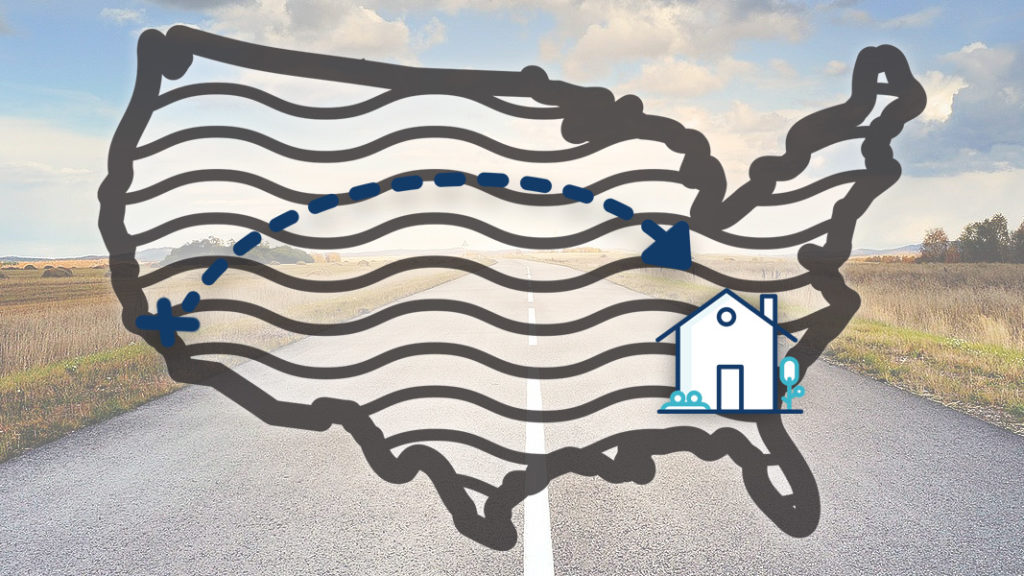In this article
If you are looking to move out of state, getting a mortgage may seem like a daunting task. However, a relocation loan, or relocation mortgage (sometimes called a RELO), is similar to other types of mortgages. Fortunately, getting a mortgage when switching jobs or moving to a different state can be relatively simple if you understand the process and plan accordingly.

Watch Now
What is a relocation loan?
A relocation loan allows you to buy a home in another state when you decide to move based on a new employment opportunity. Your ability to repay the loan is the primary concern of the lender when you apply for a mortgage and move across state lines. Qualifying for a mortgage in a new state is similar to qualifying for a mortgage in your current state, but there are some additional considerations to keep in mind when you are relocating. Specifically having your income source secure through an offer letter from your employer or written verification that you have the ability to work remotely.
Why apply for a relocation loan?
Applying for a relocation loan or a relocation package, can be beneficial in certain circumstances. This type of mortgage is sometimes offered by employers to help their employees cover the costs associated with relocating for a new job. If not you would be responsible for the move to a new state for your new job.
Here are some reasons why someone might apply for a relocation loan:
Covering Relocation Costs: Relocating for a job can be expensive. A relocation mortgage can help cover various costs, such as moving expenses, temporary housing, transportation, and other costs associated with the move.
Easing Financial Transition: Moving to a new location often involves selling a current home and buying a new one. The process can be financially challenging, and a relocation mortgage can provide financial stability during the transition.
Competitive Job Offers: Employers may offer a relocation mortgage as part of a competitive job offer to attract and retain top talent. It can make a job offer more appealing, especially for candidates who might be hesitant to relocate due to financial concerns.
Tax Benefits: In some cases, the funds provided through a relocation mortgage may be considered a tax-free benefit, which can be advantageous for the employee. However, tax laws can change, so it’s essential to consult with a tax professional for the most up-to-date information.
Employee Retention: Employers use relocation assistance to increase employee retention. By helping employees with the financial aspects of moving, companies can reduce the likelihood of their employees leaving the organization shortly after relocating.
Relocation Expenses Can Exceed Expectations: Sometimes, the actual expenses of relocating can be higher than anticipated. A relocation mortgage can act as a safety net to cover unexpected costs.
How does a relocation loan work?
If your new job requires you to move, you will have to solidify living arrangements before you relocate. If you already have an offer letter and start date, you can proceed with the purchase of your home.
If not, you’ll need to rent in the new location for at least 30 days and provide lenders with your first pay stub since it is the least stressful situation. Extended-stay hotels are popular options while you familiarize yourself with the local real estate market and surrounding community.
Alternatively, you may try buying and closing on a property in the new location before you give notice to your current job to ensure a smooth, one-time move. If you are moving quickly, understand that a purchase takes anywhere from 30 to 45 days on average, to close. Your employment will be verified when you apply for the loan and then again just before closing, so ensure that you maintain employment until the sale closes.
What are the qualifications for a relocation loan?
Qualification for a relocation loan can be more stringent compared to conforming loans. However, here are some general factors that typically apply to those seeking a relocation loan:
High Credit Score:. A credit score of 700 or higher is typically a minimum requirement
Income and Employment: You’ll need to demonstrate a stable and substantial income to qualify for a relocation loan. Specifically, have a new job lined up with an offer letter and a start date. If this is not possible you will need 30 days of paystubs with your employer before you can close.
Down Payment: Relocation loans require the same down payment as conventional loans. The exact percentage depends on your qualifications, it’s not uncommon to see down payments as low as 3% for first time buyers and 5% if you have owned a home before..
Reserve Requirements: Liquid cash reserves are required after down payment, often expressed as the number of months’ worth of mortgage payments you should have saved.
Debt-to-Income (DTI) Ratio: Your DTI ratio needs to be at 48% or lower to ensure that your monthly debt obligations, including your mortgage payment, don’t exceed a certain percentage of your income.
Due to their broad accessibility and reasonable down payment requirements, relocation loans are the go-to mortgage option for borrowers moving to a new state because of a new job. It’s essential for prospective relocation homebuyers to understand the terms and costs associated with the loan to make the best decision for their financial situation and homeownership goals. To determine your eligibility, talk with one of our mortgage advisors to start the process of exploring your options.
Are You Ready to Make a Move?
It's FREE and takes less than a minute to see what you could get.
